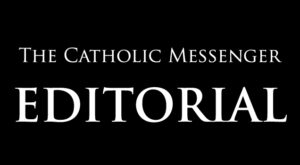 By Barb Arland-Fye
By Barb Arland-Fye
Editor
President Donald Trump visited Iowa the day before our nation’s birthday to celebrate passage of his massive budget reconciliation bill and, secondly, to share plans for next year’s celebration of our United States of America’s 250th birthday. The two celebrations seem incongruous.
Should we be celebrating tax cuts for people who least need them at the expense of children and adults, including people with disabilities, who need our help with food assistance and healthcare?
Should we be celebrating monumental increases in funding to search for and incarcerate immigrants, the vast majority of whom work and contribute to the wellbeing of our economy and our communities? People like Pascual Pedro Pedro, a 20-year-old West Liberty parishioner who works in construction?
In answering those questions, consider the following excerpts from a July 3 statement of Archbishop Timothy P. Broglio, president of the U.S. Conference of Catholic Bishops:
“… The final version of the bill includes unconscionable cuts to healthcare and food assistance, tax cuts that increase inequality, immigration provisions that harm families and children, and cuts to programs that protect God’s creation.”
“The bill, as passed, will cause the greatest harm to those who are especially vulnerable in our society. As its provisions go into effect, people will lose access to healthcare and struggle to buy groceries, family members will be separated, and vulnerable communities will be less prepared to cope with environmental impacts of pollution and extreme weather. More must be done to prevent these devastating effects,” Archbishop Broglio said.
He reminded us: “The Catholic Church’s teaching to uphold human dignity and the common good compels us to redouble our efforts and offer concrete help to those who will be in greater need and continue to advocate for legislative efforts that will provide better possibilities in the future for those in need.”
Father Rudolph Juarez, pastor of St. Anthony Parish in Davenport, writing in his parish’s newsletter July 3, shared his thoughts about our obligations as faithful citizens, blessed to live in a free society and country:
‘“But inherent with our freedom is our obligation as citizens to contribute to the good of society.’ We do this, the Catechism teaches, by: ‘ … taking charge of the areas for which one assumes personal responsibility: by the care taken for the education of family, by conscientious work and so forth, man participates in the good of others and of society’” (CC.1914).
Father Juarez said that the way we “achieve the good of others and society is to see our neighbor as another self. This is a tall order given our human nature. As the Catechism states, ‘No amount of legislation could by itself do away with the fears, prejudices, and attitudes of pride and selfishness which obstruct the establishment of truly fraternal societies’ (CC. 1931). This is very similar to what President Lyndon B. Johnson said after signing the Civil Rights Act of 1965: ‘You can’t legislate love.’ Very true. That is why the hard work of charity begins with each of us.”
“As Catholics living in a free country and society, we should never tire of hearing and practicing the word of God,” Father Juarez said. He reiterated the two greatest commandments: we are to love God with all our heart, soul, mind and strength and to love our neighbor as ourselves.
In his statement about passage of the budget reconciliation bill, National Farmers Union (NFU) President Rob Larew also speaks to the importance of looking out for others, besides ourselves.
He said the bill “strengthens the farm safety net, supports biofuels and conservation, and extends key tax incentives that help keep family farm operations viable. These wins reflect persistent advocacy from our Farmers Union members across the country…”
“However, these gains are paired with harmful tradeoffs. Cuts to SNAP divide the farm bill coalition and reductions in Medicaid will have harmful effects on millions of Americans. Farm policy should unite us. This approach undermines the foundation of the farm bill and puts its future at risk.”
Larew says a “comprehensive farm bill policy is still urgently needed, one that strengthens rural communities, ensures fair markets, and reflects the full scope of challenges facing today’s farm families …”
We will live up to our name, the United States of America, by ensuring the wellbeing of all in our country through our advocacy for fair and equitable legislation and governance and through our interactions with others. Remember, “Much will be required of the person entrusted with much, and still more will be demanded of the person entrusted with more” (Luke 12:48).
Barb Arland-Fye, Editor
arland-fye@davenportdiocese.org








